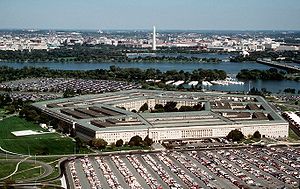 Image via WikipediaWith the final nail in the coffin for Don't Ask, Don't Tell, just days away, some gays and lesbians, who were booted out under the Clinton Era policy, are hoping to re-enlist. The New York Times reports:
Image via WikipediaWith the final nail in the coffin for Don't Ask, Don't Tell, just days away, some gays and lesbians, who were booted out under the Clinton Era policy, are hoping to re-enlist. The New York Times reports: By some estimates, hundreds of gay men and lesbians among the more than 13,000 who were discharged under the policy have contacted recruiters or advocacy groups saying they want to re-enlist after the policy is repealed on Sept. 20.
Bleu Copas is one. He had been in the Army for just three years when someone sent an anonymous e-mail to his commanders telling them he was gay. After he was discharged in 2006 under “don’t ask, don’t tell,” the military’s ban on openly gay troops, “It took away all my value as a person,” he recalled.
Michael Almy is another. When the Air Force began its investigation into whether he was gay, it suspended his security clearance and relieved him of his command. On his final day in service in 2006, police officers escorted him to the gate. “It left kind of a bitter taste,” he said.
Though the Pentagon says it will welcome their applications, former service members discharged for homosexuality will not be granted special treatment. They will have to pass physical fitness tests and prove that they have skills the armed services need right now. Some will have aged to the point that they will need waivers to get back in.
Even if they pass those hurdles, there is no guarantee that they will go back to their former jobs or ranks. And because the armed services are beginning to shrink, some will be rejected because there are no available slots.
Read the full story here.








No comments:
Post a Comment
Please keep comments relevant and civil. Comments attacking other people will be deleted.